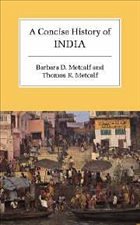Two distinguished historians, Barbara Metcalf and Thomas Metcalf, come together to write a new and accessible account of modern India. The narrative, which charts the history of India from the Mughals, through the colonial encounter and independence, to the present day, challenges imperialist notions of an unchanging and monolithic India bounded by tradition and religious hierarchies. Instead the book reveals a complex society which is constantly transforming and reinventing itself in response to political and social challenges. The book is beautifully composed and richly illustrated. It will be essential reading for anyone who wants to understand India, her turbulent past and her present uncertainties.
Table of contents:
1. Sultans, Mughals and Pre-Colonial Indian Society; 2. Mughal Twilight: the emergence of regional states and the East India Company; 3. The East India Company Raj, 1772-1850; 4. Revolt, the modern state and colonized subjects, 1848-1885; 5. Civil Society, Colonial Restraints, 1885-85; 6. The crisis of the colonial Order: Reform, disillusionment, division, 1919-39; 7. The 1940s: triumph and tragedy; 8. Congress Raj: democracy and development, 1950-89; 9. Democratic India in the nineties.
In a challenging new history of modern India, the authors explore the imaginative and institutional structures that have changed and sustained the country. They also document the social changes and rich cultural life that evolved in interaction with that political structure and vision. The work represents a tour de force.
A new history of modern India challenges traditional interpretations, and explores the politics and cultural life of a unique society.
Table of contents:
1. Sultans, Mughals and Pre-Colonial Indian Society; 2. Mughal Twilight: the emergence of regional states and the East India Company; 3. The East India Company Raj, 1772-1850; 4. Revolt, the modern state and colonized subjects, 1848-1885; 5. Civil Society, Colonial Restraints, 1885-85; 6. The crisis of the colonial Order: Reform, disillusionment, division, 1919-39; 7. The 1940s: triumph and tragedy; 8. Congress Raj: democracy and development, 1950-89; 9. Democratic India in the nineties.
In a challenging new history of modern India, the authors explore the imaginative and institutional structures that have changed and sustained the country. They also document the social changes and rich cultural life that evolved in interaction with that political structure and vision. The work represents a tour de force.
A new history of modern India challenges traditional interpretations, and explores the politics and cultural life of a unique society.

